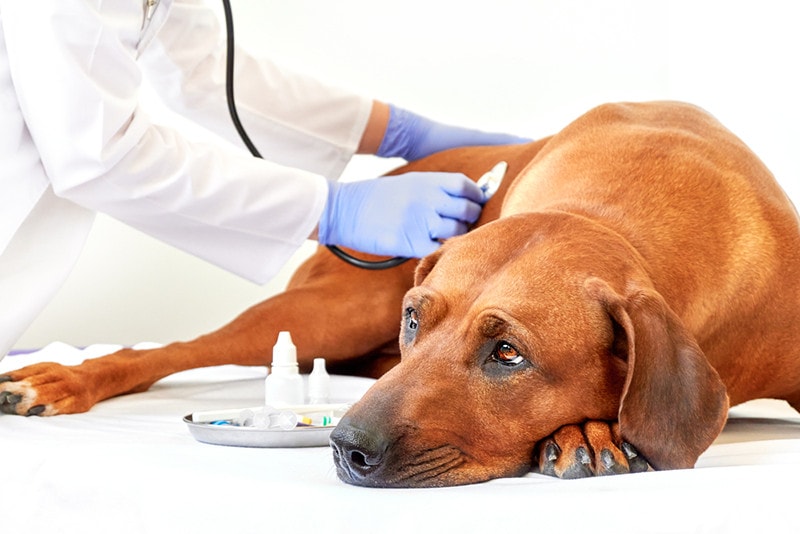For a lot of dog owners, the morning routine revolves around their dog. Many dog owners will help get this process rolling by brewing a cup of coffee in the morning. Has your dog been a part of this routine with you? What if they decide to open the bag of coffee beans on their own?
Coffee is bad for dogs because it has caffeine in it. What might happen if they eat coffee beans depends on how many they eat, how big they are, and if they already have any health problems. Here’s what you need to know.
Many dog owners enjoy starting their day with a fresh cup of coffee. However, coffee beans and grounds contain caffeine, which can be harmful to dogs if ingested. Caffeine is a stimulant that, in high doses, can cause toxicity and potentially life-threatening symptoms in dogs.
How Caffeine Affects Dogs
The caffeine in coffee tea soda, energy drinks, and chocolate is completely safe and enjoyable for humans (in moderation). However, caffeine has a much different effect on canines.
Dogs are far more sensitive to caffeine than people. According to the Pet Poison Helpline it only takes 100-150 mg of caffeine per kg of body weight to cause toxicity in dogs. That means a 30 lb dog could become ill after ingesting just two tablespoons of ground coffee. Smaller dogs need to consume even less.
When dogs ingest caffeine, it is rapidly absorbed into their bloodstream. As a stimulant, caffeine increases heart rate, blood pressure, body temperature, and respiration. It also causes smooth muscles to relax, most notably the sphincter that keeps stomach contents from entering the intestines.
At toxic doses, caffeine overstimulates the central nervous system and cardiovascular system, leading to:
- Hyperactivity and restlessness
- Panting
- Vomiting
- Diarrhea
- Abnormal heart rhythms
- Muscle tremors and twitching
- Seizures
Dogs with underlying heart conditions are at an even higher risk for caffeine toxicity. While a few licks of coffee or tea are not harmful, ingesting concentrated sources of caffeine like coffee beans, grounds, or tea bags can be extremely dangerous.
Signs of Caffeine Toxicity
The most common signs of toxicity from ingesting coffee beans or grounds include:
- Excessive panting
- Agitation and restlessness
- Vomiting
- Diarrhea
- Increased heart rate
- Irregular heartbeat
- Muscle tremors and spasms
- Incontinence
- Seizures
These symptoms usually develop within 1-2 hours after ingestion. However, the onset time can be affected by whether the dog ate the beans/grounds on a full or empty stomach.
Dogs displaying mild symptoms like vomiting or hyperactivity after eating coffee products should still be evaluated by a vet. More severe symptoms like muscle spasms, abnormal heart rate, and seizures can be life-threatening.
How Much Coffee Can Cause Problems?
The amount of coffee beans or grounds needed to make a dog sick depends on the dog’s size and weight. Small dogs usually have symptoms after ingesting 1-2 beans or teaspoons of ground coffee. Medium or large dogs can become ill after eating 10 or more beans.
According to the Merck Veterinary Manual, as little as 1-2 tablespoons of brewed coffee can cause toxicity in smaller dogs weighing less than 10 pounds. Larger dogs may show symptoms after ingesting a cup or more of coffee.
However, these are just general guidelines. The caffeine content varies widely in different coffee products. Dark roasts tend to be higher in caffeine than lighter roasts. Espresso also packs more caffeine per volume than regular drip coffee.
So if your dog ingests any amount of coffee beans, grounds, or drink, it’s best to call your vet or the ASPCA Poison Control Center for an assessment based on your dog’s size and the specifics of what they ate.
Treatment for Caffeine Toxicity
If your dog eats coffee beans or shows signs of caffeine toxicity, call your veterinarian or emergency vet clinic immediately. Timely treatment is critical.
If you discover the ingestion soon after it happens, your vet may advise inducing vomiting at home using hydrogen peroxide. This should only be done if instructed by your veterinarian.
At the veterinary clinic, the first step is to stabilize your dog and address any life-threatening symptoms like irregular heartbeat, seizures, or extremely high blood pressure. Medications can be given to control heart rate and blood pressure. Anti-seizure medications are used for seizures.
To limit further absorption of caffeine, activated charcoal may be administered. This binding agent absorbs toxins in the GI tract before they enter the bloodstream. However, charcoal is only helpful if given within 2-3 hours of ingestion.
Most dogs need to be hospitalized and monitored for 12-24 hours after ingesting a toxic dose of caffeine. Intravenous fluids help flush the caffeine out of the body and prevent dehydration from vomiting and diarrhea.
With aggressive treatment, dogs usually make a full recovery. Rarely, dogs may experience liver damage or acute kidney failure as a result of caffeine toxicity. Puppies, small dog breeds, and dogs with pre-existing conditions have a higher risk for life-threatening complications.
Preventing Caffeine Exposure
The best way to avoid caffeine poisoning is to keep all coffee and tea products safely out of your dog’s reach. Even an inquisitive 10 lb dog can get into trouble rooting through the pantry or knocking over the trash.
Store coffee beans and grounds in sealed containers in high cabinets or pantries. Never leave brewed drinks unattended where your dog could access them. Securely dispose of K-cups with coffee grounds after use.
Also avoid giving dogs foods and treats containing chocolate, which naturally contains caffeine. And check labels before giving OTC medications, since combinations drugs for pain or cold/flu often include caffeine.
If your dog accidentally eats something with caffeine, call your vet right away for advice. With prompt veterinary treatment, most dogs recover fully after caffeine exposure. But left untreated, caffeine toxicity can be rapidly fatal in dogs. So keep all coffee, tea, and cocoa safely away from your curious canine.
Frequency of Key Entities:
Coffee beans: 9
Grounds: 5
Brewed coffee: 2
Toxicity: 11
Symptoms: 7
Caffeine: 16
Vomiting: 5
Diarrhea: 3
Seizures: 3
Abnormal heart rate: 3
Muscle tremors: 4
Treatment: 5
Veterinarian: 5
Hospitalization: 2

How Is Caffeine Toxicity Treated in Dogs?
The dog’s treatment will depend on how badly poisoned it is and how quickly it gets to the vet.
People will make a dog throw up coffee beans if they see them within an hour or two of eating them. This greatly lowers the risk of poisoning. Depending on how many they ate and how fast this happens, they might not need any more care after this step.
Another potential addition to inducing vomiting is giving activated charcoal. You can give this very dark liquid to your dog by mouth, and it works very well to bind most toxins in the dog’s digestive tract. This may make the toxin inactive, which means the body can’t take it in. Instead, it stays in the GI tract and is passed out of the body in the stool.
For dogs that are already showing signs of caffeine toxicity or are likely to, it is very important to give them supportive care like intravenous fluids, medicine to make them feel better, a bland diet, and a safe place to rest. Medications can also fix certain changes, like heart rates that are too fast or too slow, high blood pressure, muscle tremors, seizures, or severe vomiting or diarrhea.
Most dogs that get sick after drinking caffeine will need to stay in the vet’s office for at least one day. Some may need to stay for several days, especially if they already have other serious health problems.

What Happens if a Dog Eats Coffee Beans?
Caffeine, a stimulant that people love and often depend on, is poisonous to dogs but is eaten by dogs that eat coffee beans.
Caffeine is a stimulant that makes a dog’s heart beat faster. But too much of it can cause cardiac arrhythmias, which are irregular heartbeats, and even serious neurological signs. When you drink caffeine, even in small amounts, you can get stomach problems and feel a bit anxious all the time.
What kinds of symptoms a dog might show depend on how many beans they eat, how big they are, and their overall health, especially their heart or brain health. An occasional coffee bean is fine for a small dog, but if a dog opens a bag of coffee beans and eats a lot of them, even a Great Dane could get sick.
If you are worried about your pet’s health and well-being, you should talk to a vet about what to do.
Speak To a Vet Online From the Comfort of Your Couch! 
If you need to speak with a vet but can’t get to one, head over to PangoVet. It’s an online service where you can talk to a vet online and get the personalized advice you need for your pet — all at an affordable price!
Click to Speak With a Vet

Caffeine Poisoning in Dogs | Wag!
FAQ
What happens if my dog eats coffee beans?
How many coffee beans are bad for dogs?
What happens if my dog licks coffee?
How much coffee is toxic for dogs?
